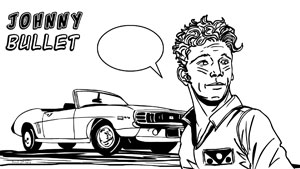|
|
 |
The Constant Gardener is an adaptation of a John Le caré novel. Le Caré is a well-known spy thriller writer who wrote about the quest British diplomat Justin Quayle, stationed in Kenya, to avenge his activist wife’s murder. Tessa Quayle was investigating the testing of a dangerous new tuberculosis-fighting drug on barely consenting tests subjects in Kenya receiving treatments and medical services sponsored by a huge drug company. When Tessa Quayle’s investigation was about to reveal damning secrets about the drug to Western audiences, Justin Quayle’s superiors at the embassy had her and her colleague Dr. Arnold Bluhm assassinated.
Released in 2005, the film adaptation featuring Ralph Fiennes in the role of Justin Quayle was crafted on several flashback sequences which in the end connected to the first evocative scene used in the film. It added a sensual flavour to the movie. The first half of the film was slow, as Quayle methodically gathers information about his wife’s secret activities while former friends and colleagues close in on him. The film hints that Dr. Bluhm was Tessay Quayle’s secret lover and that revelation angered Justin and had him doubt the loyalty of his wife.
Blood Diamond is the story of Sierra Leonean fisherman Solomon Vandi (Djimon Hounsou) who loses his family during an attack by a local paramilitary mob in his village. Captured and forced to work in a diamond mine, Vandi finds a precious large diamond that he hides from his suspecting captors. However, one of them reveals out loud that he has found something valuable which makes white Zimbabwean mercenary and smuggler Danny Archer (Leonardo Di Caprio) interested in the fisherman. Rescuing Vandi, Archer forces him to find the diamond, in hopes of leaving Africa forever.
Released in 2006, this film earned several Oscar nominations. Unlike The Constant Gardener, Blood Diamond specifically discussed Africa as a place and a concept where a black man like Vandi was of no value while a white man like Archer, had a little more rank, but not much, in the greater scheme of things. Blood Diamond, directed by American Edward Zwick had none of the subtleties of Brazilian Fernando Meirelles. Whereas, Meirelles displayed most explosions and gory attacks off-screen, Zwick seemed to revel in violence.
 |
Both Bluhm and Vandi were pawns of others on this film. To some extent, the Quayles and Archer were also pawns, each meeting death in the end. Justin Quayle was never driven for a need to help the poor Africans, like his wife was. His revenge was motivated solely by his love for his wife. Archer was also motivated, but by greed. In the end, he is rehabilitated by offering the diamond to Vandi. He didn’t have much option as he was dying. He also never had to make a moral decision about whether he would kill the man that had helped him find the diamond. I did not like how Zwick evaded the moral dilemma about Archer killing Vandi by having him die instead and just give the African the diamond as a last resort. Archer repeatedly mistreated Vandi in the film, yet his racism and feelings of superiority were never fully recanted. He simply had no choice but to see his dream live on in another man.
Blood Diamond also was more stereotypical of what Westerners think of Africa. Most of the African characters spoke in a funny accent that did not feel authentic. Actor Hounsou did not even feel like he belonged to the same ethnicity as the other Sierra Leoneans in the film. His features were just too different. However, Hounson is a leading “African” actor and thus, like Sidney Poitier, generations ago, becomes the token and African actor du jour. His blackness must pass authoritatively for any African character. Western audience, after all, cannot see the difference. All black people look the same anyway.
The Constant Gardener had a pivotal scene, in my opinion that showed an educational play by African actors featured outdoors. It was played in their dialect and although a small detour from the main thrust of the film, allowed the natives to speak to the audience directly in their own voices. There is no such allowance in Blood Diamond. When African characters speak in their native languages, or even when they speak English, it is to advance the main plot only.
 |
Mudimbe wrote about that when he said that Africa had been invented. It is not a real place with the most cultural diversity found anywhere on Earth. Instead, it is the black continent, still suffering from centuries of colonialism and nowadays white liberal guilt. These movies continue to portray Africa as a place that marvels Western audiences in a generic pot-pourri. One would never assimilate all the differences of Asia or Western Europe into one identity the way these films did. In The Constant Gardener, there was an attempt to show the real voice of the locals, but ultimately, it was a film about Europeans just visiting. In Blood Diamond, Africa was more than the backdrop, but all of the old colonial attitudes and jingoistic behaviour remained. In the end, the heroic Archer helped the poor fisherman earn a better life for himself and his family, even though he had always been the rightful owner of the diamond.
© Copyright 2002-2026 by Toon Doctor Inc. - All rights Reserved. All other texts, images, characters and trademarks are copyright their respective owners. Use of material in this document (including reproduction, modification, distribution, electronic transmission or republication) without prior written permission is strictly prohibited.

